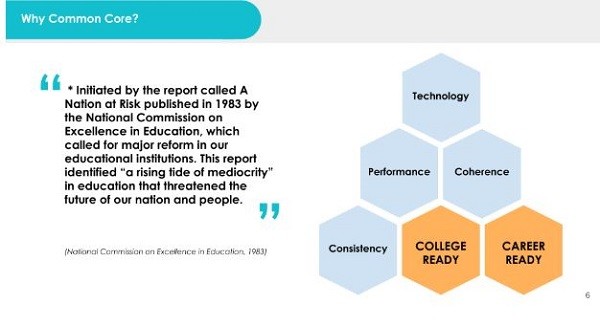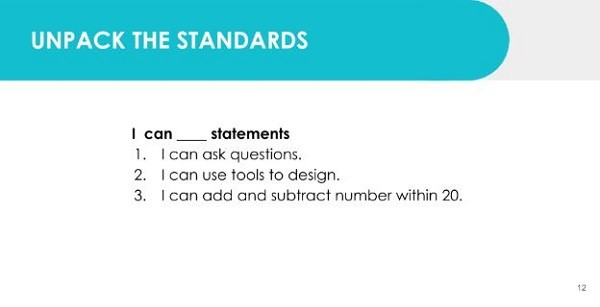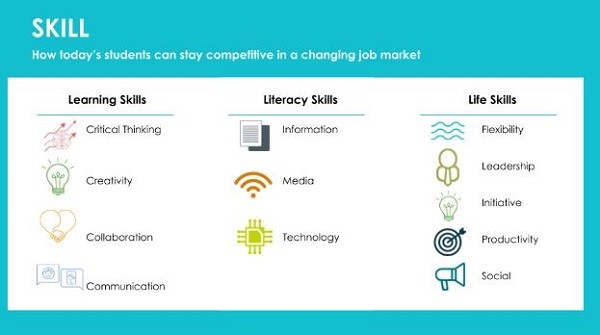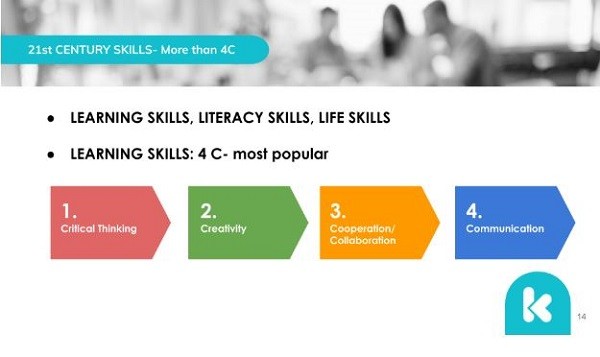CCSS - Common Core State Standards is the largest and most important educational reform for US public schools ever.
So what is learning English in accordance with American standards - What is Common Core, why is it so important and why should it be especially applied in children's education?
Master Hong Dinh, whose full name is Dinh Thu Hong, is Master of Education, majoring in Teaching English as a Second Language (ESL), currently a teacher at New Life Academy of Excellence Primary School, Georgia, USA.
Master Hong Dinh is the author of the book "Learning American at home" which is well received by parents.
Participating in Livestream #KidTopiEnglish - Learning American English, Master Hong Dinh and KidTopi provide parents with a clearer view of CCSS and 21st-century skills children need.
Common Core - towards preparing a solid foundation for children
Released in June 2010 by The Council of Chief State School Officers (CCSSO) and National Governors Association Center for Best Practices (NGA), Common Core is a set of educational standards applied from 2010 to present in most US states (41/51 states).
The CCSS is a collection of clear, consistent guidelines about what students need to know in order to understand subjects from kindergarten through grade 12.
 |
|
The 1983 "Nation at Risk" report, warning of the "banal wave" in the education system, threatens the future of the country and its people, as a wake-up call for American education. Based on the call for revision from the report, Common Core was born, focusing on "College and career ready", consistency, cohesion, hands-on learning and technology. |
Common Core emphasizes the "college and career ready" element: preparing students better for college as well as career skills.
Because in the past, many programs in the US were primarily test driven curriculum (programs that aim to get high scores in standardized tests).
The programs mainly focus on the test, do not develop and test the level of creativity and critical thinking of students, focusing.
The Common Core focuses on creativity, collaboration, critical thinking, instead of closed-form tests like bubble-test or multiple choice.
Common core reading is a complex text, which is harder to read, causing students to think and dig deep.
In particular, learning and teaching will follow a project-based project, assessing the competencies based on what you do in a project. Thereby, you will show your ability and understanding.
Unlike standardized tests such as IELTS, TOEFL only assesses a student's skill at a given time, without a combination of skills.
Common Core assesses students in many skills at the same time through lessons, lessons, project / performance base, assessment of competencies based on the projects they work on so that they can show their curiosity and creativity to innovate. , solution to the problem.
This method of evaluation is more comprehensive and encouraging, for example, for students who immigrate to the US, if they make them take the grammar test, the score will be very low, but when participating in the project with their friends , encouraged, children will make more positive contributions and feel more successful.
 |
|
Common Core standards are simplified for students to understand. |
CCSS, when introduced into teaching, is detailed and concretized in many ways, both for teachers and students as for students instead of leaving the whole content of a specific standard worded with many terms. simplified and broken down into an I can statement.
21st Century Skills - Basic foundation to help children step firmly into the future
21st century skills are divided into 3 large groups as below:
 |
|
Ministry of skills of 21st century citizens. |
- Learning Skill (4C) - learning skills, including:
+ Critical thinking: Critical thinking
+ Creativity: Creative ability
+ Collaboration: Possibility of cooperation
+ Communication: The ability to communicate and convey ideas
- Literacy skill - Knowledge skill:
+ Information: Ability to collect information
+ Media: Ability to use the media
+ Technology: Ability to use technology
- Life skill - Life skill:
+ Flexibility: The ability to be flexible and transform in any situation
+ Leadership: The ability to lead and lead
+ Initiative: The ability to give ideas
+ Productivity: Ability of labor efficiency
+ Social: The ability to use social media tools
 |
|
Going into the 4C skill set. |
- Critical thinking is the skill of finding solutions to all problems, the ability to read questions, analyze and solve problems.
To practice critical thinking for children, parents can practice their children through daily activities to find other solutions to problems, or encourage children to ask open-ended questions instead of closed-ended questions.
- Creativity: There are two factors that create creativity, including: Unique ability (Originality) is the unique and unique ability that only children can think of and ability to build (Elaboration). ): ability to add details, images to create new things.
- The ability to work in groups (collaboration): to develop this skill, children should learn while participating in the project, working together from the beginning until the idea is completed, through which they will learn skills listen to others opinions, the ability to present to others without communication errors, such as decrying others without evidence.
- With communication skills (communication), it is encouraging children to give their ideas through words. If your baby has ideas but only expressed on paper, it is not effective, when children know how to express ideas through words is much more effective.
How does your child learn English accordingly?
Answering parents' questions about teaching children English early, Ms. Hong Dinh said that children should learn English only after mastering their native language.
Starting to learn English from 5-12 years old is not late, children will have a very long time to learn English.
In addition, as KidTopi's program is one-to-one learning with North American teachers, the online learning platform will maximize personalization for the child, serving the unique needs of each student, while also allowing the child At the same time, sharing about the form of learning English online and the traditional center, Ms. Hong Dinh said that online learning has many outstanding advantages. Learning online will allow children to be more active in time and place to study.
However, the downside of online learning lies in interactivity. At the moment, technology has been very developed, so the interaction between online and offline will not be too different.
Đinh Thu Hong